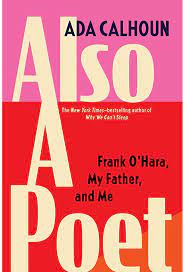
For the record, non-fiction writer Ada Calhoun is *not* “also a poet.” Her book wanted to be a biography of Frank O’Hara but it’s not that, either. It almost wound up being a memoir, but alas, it’s not quite that, either.
Honestly, her book had no choice in the matter. Her father Peter Schjeldahl had collected all manner of taped interviews of people who knew Frank O’Hara, intending to write a biography of the New York School poet, but it all came to naught, partly because of his make-up and mostly because of the recalcitrance of O’Hara’s sister Maureen Granville-Smith, who is the literary executor of Frank’s estate.
Upon discovery of the tapes, daughter Ada decides to fill Dad’s big shoes by writing Frank’s bio herself, picking up where he left off. Only there’s this problem called Maureen Granville-Smith, still alive and well, still recalcitrant, and every bit as stubborn about blocking a bio by Ada as she was a bio by her dad.
This leaves Ada with little choice but to write a semi-biographical O’Hara book and a semi-memoir of herself book — the story of her attempt to write an O’Hara biography, how it brought to a head some lifelong issues she’d had with her dad, and how the manuscript wrestled on the floor, two genres fighting it out to a draw.
Thus you get word-for-word excerpts from Peter’s tapes of people who knew Frank O’Hara because Dad gave Ada permission to try where he failed. She fails, too, and provides a transcript of her phone conversation with Frank’s sister, who comes across as a termagant sure that no one can do her boy Frank justice.
Weird.
But the book itself is weirdly wonderful. It leans more frankly in a biography kind of way in the first half, then in a decisive memoir kind of way in the second. What is it about these artistic fathers who don’t know how to love their children, even when their children enter the same trade, in this case, the trade of writing? Rhetorical question.
Interesting? Firstly the excerpts from the tapes. Then, as the story builds, the dynamic between father and daughter. And trivia. Lots of trivia and odd bits, like Ada sharing her favorite O’Hara poem, which led me to my copy of The Collected Poems of Frank O’Hara edited by Donald Allen. For the curious, here it is:
To the Harbormaster
I wanted to be sure to reach you;
though my ship was on the way it got caught
in some moorings. I am always tying up
and then deciding to depart. In storms and
at sunset, with the metallic coils of the tide
around my fathomless arms, I am unable
to understand the forms of my vanity
or I am hard alee with my Polish rudder
in my hand and the sun sinking. To
you I offer my hull and the tattered cordage
of my will. The terrible channels where
the wind drives me against the brown lips
of the reeds are not all behind me. Yet
I trust the sanity of my vessel; and
if it sinks, it may well be in answer
to the reasoning of the eternal voices,
the waves which have kept me from reaching you.
No, not O’Hara’s most famous poem by any means, but probably one that speaks to Ada Calhoun because she reads “father-daughter” into it (whereas O’Hara had some other relationship in mind).
Another oddity: one of O’Hara’s (who worked at the MoMA) favorite paintings is Rembrandt’s The Polish Rider. Again, not something that comes to mind when one thinks of the Dutch Master smoking cigars while New York poets originally from Grafton, MA, (of all nearby places!) might choose one of his works as “great,” but Frank kind of liked the looks of the horseman. You can find him riding online. The Pole, not Frank.
OK, wrap-up time.
Who would like this unaligned genre of a book? Certainly peeps interested in poetry in general and O’Hara in particular. Or fans of the anything-goes NYC scene in the 50s and 60s (even were he never struck and killed in July of ’66 by a dune buggy at the beach on Fire Island, I fear O’Hara’s liver would have taken him down soon enough). Or readers with a particular interest in problematic family relationships— in this case, a daughter who must forge a separate peace because the daddy she so wants to impress is who he is, as imperfect as any Y-chromosome can be.
If you fit one of those descriptions, you should pick it up. If not and you’re curious, pick it up as well. Over, out, and also a poet,
Ken C.